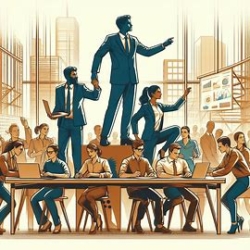 Each technological revolution has gotten faster; and the era of Artificial Intelligence is accelerating at an unprecedented rate—an intimidating prospect, given Musk’s recent prediction of AI surpassing human intelligence. Some say the tech will take on “80 percent of the jobs that exist today”, but history has shown that technological advancements have consistently led to the creation of new job roles, elevating the standard of living and improving overall productivity.
Each technological revolution has gotten faster; and the era of Artificial Intelligence is accelerating at an unprecedented rate—an intimidating prospect, given Musk’s recent prediction of AI surpassing human intelligence. Some say the tech will take on “80 percent of the jobs that exist today”, but history has shown that technological advancements have consistently led to the creation of new job roles, elevating the standard of living and improving overall productivity.
Elon Musk’s recent prediction that AI will surpass human intelligence rings true, particularly in the light of the recent passing of the EU’s Artificial Intelligence Act, confirming AI’s permanence. It’s crucial government bodies and businesses are mindful about its adoption, and ways of working alongside it. The successful integration of AI into the workforce relies on nurturing cultures that prioritise continuous learning and the investment of employee upskilling – vital for equipping individuals with practical skills and encouraging critical thinking to effectively manage AI applications. This is integral in discerning between tasks that still necessitate human expertise and those that can be automated by the likes of AI and Machine Learning.
Following the recent passing of the Act confirming the permanence of artificial intelligence, the transition to AI-powered technologies within business is the next step in our evolutionary process.
Adapt and adopt
We now know that if you give people more powerful tools, it’s not just that they can work faster, but it frees up their time to do qualitatively different, and more important, tasks. Having been through significant technological shifts before, a crucial element of successful adoption is for leadership teams to invest in employee education and upskilling initiatives. After all, AI is only as intelligent as those who use it. It requires human talent who can harness it responsibly to unlock its full potential as a force for good.
The successful integration of AI into the workforce relies on nurturing cultures that prioritise continuous learning—vital for equipping individuals with practical skills and encouraging critical thinking to effectively manage AI applications. This is integral in differentiating between tasks that still necessitate human expertise and those that can be automated by the likes of AI and Machine Learning (ML). In turn, human talent will be equipped with the right tools to leverage AI as an extension to their skillset, seizing the wealth of opportunities it will create.
Ethical considerations
As we hurtle along our unstoppable technological course, the impact on society hinges on integrating robust ethical frameworks within AI models. For example, the OECD AI Principles guide AI actors in their research into development of effective solutions, illustrating the ethical, inclusive values AI should adhere to, to remain robust and fit for purpose.
It is crucial leadership and HR teams align with the OECD’s values, ensuring AI systems are not only advanced, but also safe, transparent, and accountable—key qualities that foster trust and reliability. The reasonable concerns surrounding public safety and ethical standards highlight the urgency of implementing policies and strategies that ensure AI’s ethical and equitable deployment. This is critical for garnering social acceptance and public buy-in.
That said, we must also ensure that any regulatory framework allows flexibility in adapting to evolving technologies. Striking this delicate balance is essential for responsibly harnessing the benefits of technological innovation.
What’s next?
We are living through a transformation that marks a definitive before and after for society. The collective efforts of unions, regulatory authorities, educational institutions, and CEOs are vital in ensuring the ethical and equitable deployment of AI. This approach must balance profitability with human productivity and most importantly, wellbeing—aligned with the UN’s sustainable development goals promoting sustained, inclusive economic growth.
When used to complement human talent, AI will open the door to more purpose-driven work environments, driving long-term economic success and initiating a new era of collaboration.














May 13, 2024
We must embrace AI for sustainable workforce transformation
by Christian Rebernik • Comment, Technology
Elon Musk’s recent prediction that AI will surpass human intelligence rings true, particularly in the light of the recent passing of the EU’s Artificial Intelligence Act, confirming AI’s permanence. It’s crucial government bodies and businesses are mindful about its adoption, and ways of working alongside it. The successful integration of AI into the workforce relies on nurturing cultures that prioritise continuous learning and the investment of employee upskilling – vital for equipping individuals with practical skills and encouraging critical thinking to effectively manage AI applications. This is integral in discerning between tasks that still necessitate human expertise and those that can be automated by the likes of AI and Machine Learning.
Following the recent passing of the Act confirming the permanence of artificial intelligence, the transition to AI-powered technologies within business is the next step in our evolutionary process.
Adapt and adopt
We now know that if you give people more powerful tools, it’s not just that they can work faster, but it frees up their time to do qualitatively different, and more important, tasks. Having been through significant technological shifts before, a crucial element of successful adoption is for leadership teams to invest in employee education and upskilling initiatives. After all, AI is only as intelligent as those who use it. It requires human talent who can harness it responsibly to unlock its full potential as a force for good.
The successful integration of AI into the workforce relies on nurturing cultures that prioritise continuous learning—vital for equipping individuals with practical skills and encouraging critical thinking to effectively manage AI applications. This is integral in differentiating between tasks that still necessitate human expertise and those that can be automated by the likes of AI and Machine Learning (ML). In turn, human talent will be equipped with the right tools to leverage AI as an extension to their skillset, seizing the wealth of opportunities it will create.
Ethical considerations
As we hurtle along our unstoppable technological course, the impact on society hinges on integrating robust ethical frameworks within AI models. For example, the OECD AI Principles guide AI actors in their research into development of effective solutions, illustrating the ethical, inclusive values AI should adhere to, to remain robust and fit for purpose.
It is crucial leadership and HR teams align with the OECD’s values, ensuring AI systems are not only advanced, but also safe, transparent, and accountable—key qualities that foster trust and reliability. The reasonable concerns surrounding public safety and ethical standards highlight the urgency of implementing policies and strategies that ensure AI’s ethical and equitable deployment. This is critical for garnering social acceptance and public buy-in.
That said, we must also ensure that any regulatory framework allows flexibility in adapting to evolving technologies. Striking this delicate balance is essential for responsibly harnessing the benefits of technological innovation.
What’s next?
We are living through a transformation that marks a definitive before and after for society. The collective efforts of unions, regulatory authorities, educational institutions, and CEOs are vital in ensuring the ethical and equitable deployment of AI. This approach must balance profitability with human productivity and most importantly, wellbeing—aligned with the UN’s sustainable development goals promoting sustained, inclusive economic growth.
When used to complement human talent, AI will open the door to more purpose-driven work environments, driving long-term economic success and initiating a new era of collaboration.